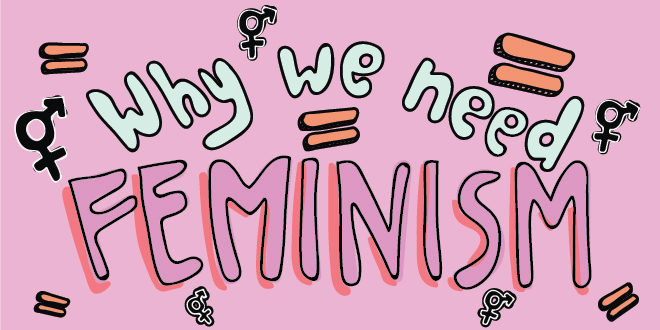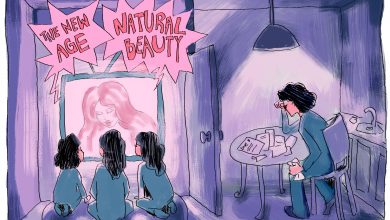Why Feminism?

Illustration by Maddy Pease
When you bring up feminism in a conversation, you usually get three different reactions: a strong surging support, an immense hatred and apathy, or a hesitant indecisiveness. It is this hesitant reaction that bothers me the most, since it seems that these people are afraid of identifying as feminists. Yet, the word “feminism” itself demonstrates our need for feminism.
I recently interviewed a woman who considered herself a “partial” feminist. Confused as to what she meant, I asked her for further clarification. As she went on to talk about how she views gender stereotypes, and discriminatory issues that both genders face, her arguments were essentially the same as any other person who considers themself a feminist. This mainly entails that women and men should be equal in both opportunities and rights, and one group should not be marginalized in any way. Yet she still considers herself a “partial feminist.”
The hesitant reaction is essentially the human embodiment of how our society has ingrained us with gender expectations. It portrays the idea that somehow being associated with a word that heavily argues and protests for feminine equality is something that could be considered shameful or unordinary to be a part of. Thus, considering yourself a “partial” feminist can somehow exempt you from that association. Equality cannot be accomplished if people are hesitant to be a part of the movement, simply because they are afraid of being judged or receiving backlash from people.
So why is “feminism” called “feminism”? Why not, as many people suggest, do we call the feminist movement “equalists” or “humanists” if equality is what we are trying to achieve? First of all, changing the name would suggest that total equality has already been achieved, which of course, it has not. Even in a country as progressive as the United States of America, where many men and women are feminists, something as simple as getting the same pay for doing the same job, same hours, same effort, has not been accomplished! So, changing the name of feminism would degrade and diminish all the effort that has already been put towards the progression of women, and equality for men and women. What is so wrong with having a movement named after the minority that is trying to make the change? Until all things are totally equal for both men and women, why should the name even change?
There are some unfair and unrealistic expectations put onto both men and women. Men can’t show emotion. A woman is always irrational when she is on her period. We’ve all heard these stereotypes over and over, and aren’t we sick and tired of having stereotypes define us? Portraying the boundaries in which we can only exist, never “allowed” to exceed them and break through? And even if someone does break through, they are always faced with some kind of judgment and constantly scrutinized for any mishap.
Don’t be afraid to be considered a feminist, especially if total equality is what you want. The argument on whether or not feminism should retain its name should not even exist in the first place! Changing the name would change the movement and all that feminism stands for; what kind of move would that be? Perhaps we will know equality has been established when no one longer attaches any kind of judgment to the word feminism, or questions the name and the movement.




